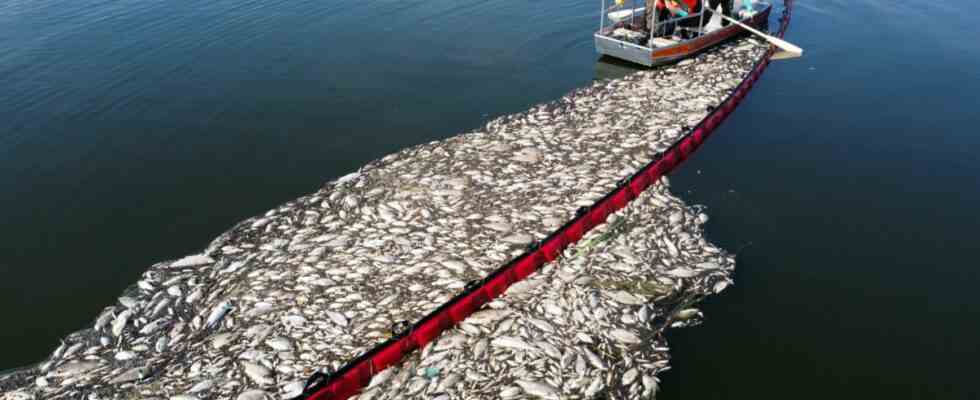Poland and Germany have agreed to work closely together to clarify the causes of the fish kill in the Oder. Federal Environment Minister Steffi Lemke (Greens) met her Polish colleague Anna Moskwa in Szczecin on Sunday evening. The Polish Infrastructure Minister Andrzej Adamczyk and the Environment Ministers of Brandenburg and Mecklenburg-Western Pomerania, Axel Vogel (Greens) and Till Backhaus (SPD), also took part in the meeting. They agreed to coordinate the response to the crisis with a joint group of experts and to ensure a close and permanent exchange of information in order to determine the causes of the fish kills.
Lemke said that solution-oriented discussions had been held and that “good, joint steps” had been agreed. The meeting followed harsh criticism from Germany of the Polish government’s behavior. Despite existing alarm plans for the International Commission for the Protection of the Oder against Pollution (IKSO), the Polish side only informed the German authorities on Thursday, days after masses of dead fish had already been found in the upper reaches of the river. In Poland, there are suspicions that toxins could have gotten into the water near Opole on July 25th.
According to the authorities in Brandenburg, they received the first information last Tuesday when a skipper reported that dead fish were floating on the river. Lemke warned that failure to identify the culprit could lead to a massive loss of trust “especially among the Polish population, but probably among us too.” In the border region, there is massive anger on the German side about the behavior of the Polish government, but the people and local authorities in Poland are also outraged that they were not informed by the government in Warsaw.
Lemke spoke of a “really bad environmental disaster”, the effects of which could possibly extend for years. The cause is still unclear. The fish kill was not caused by mercury or other heavy metals, said Poland’s Environment Minister Moskva. This would have been the result of laboratory tests on dead fish. Now samples of the fish would be examined for another 300 harmful substances, including pesticides. In addition, dead fish are to be dissected and the behavior of the animals examined shortly before they die.
“In fact, the entire ecosystem of the Oder is damaged”: joint press conference by Poland’s Infrastructure Minister Andrzej Adamczyk (from left) and Environment Minister Anna Moskwa with Federal Environment Minister Steffi Lemke.
(Photo: Marcin Bielecki/dpa)
Moskva said water samples showed elevated oxygen levels, which is unusual for the summer period and low water levels. It is possible that the water was oxidized. This could indicate that the fish kills may not have a natural cause, but that there is a perpetrator who released substances into the water.
Brandenburg’s Environment Minister Vogel made a similar statement. The state laboratories in Brandenburg analyzed the water of the Oder in a broadband study. The result will probably only be available in a few days. But there is an “absolute anomaly”: A high oxygen content, a high pH value and a high salt load have been found. The reasons for this are not yet known. It is also unclear whether other substances got into the Oder.
The drought also contributes to the disaster
Vogel also warned of the long-term effects of the poisoning. “We’re always talking about fish now, in fact the entire ecosystem of the Oder is damaged,” he said on Monday on RBB Inforadio: “We have really long periods of time where mussels, mollusks and insects in particular need time to recover build up.” The minister assumes that a chain of factors led to the disaster. The drought and the low water level of the Oder would almost certainly have played a part in this. Because the ecosystem as a whole is affected, the consequences cannot be solved within six months by repopulation with fish.
The clean-up work continued on the Oder. At Gartz, as before on the Polish side, an oil barrier in the river was supposed to prevent the carcasses from drifting further away. In Gryfino, 30 kilometers north of Schwedt, there were no large numbers of dead fish on either the eastern or western arm of the border river on Sunday afternoon. Reports from the Szczecin Lagoon that there were carcasses floating in the water were not confirmed. However, the authorities reckon that the toxins should have reached the area. Water samples taken on Saturday reportedly revealed unremarkable values.

